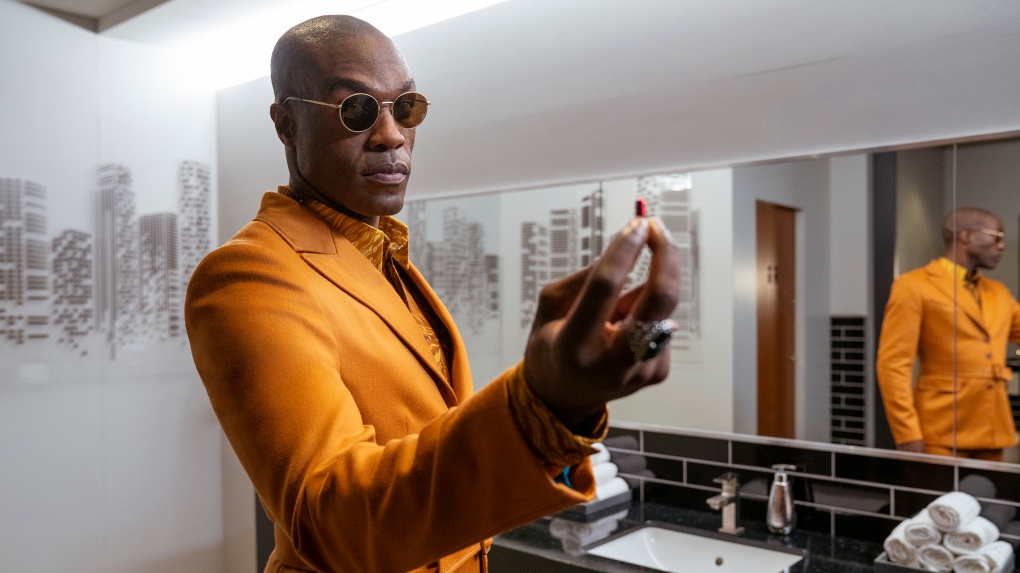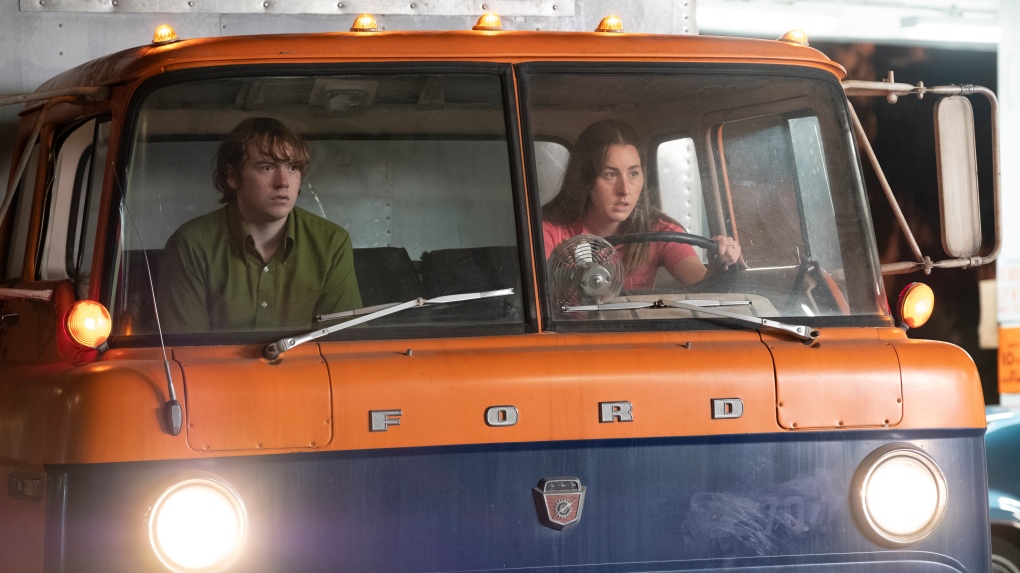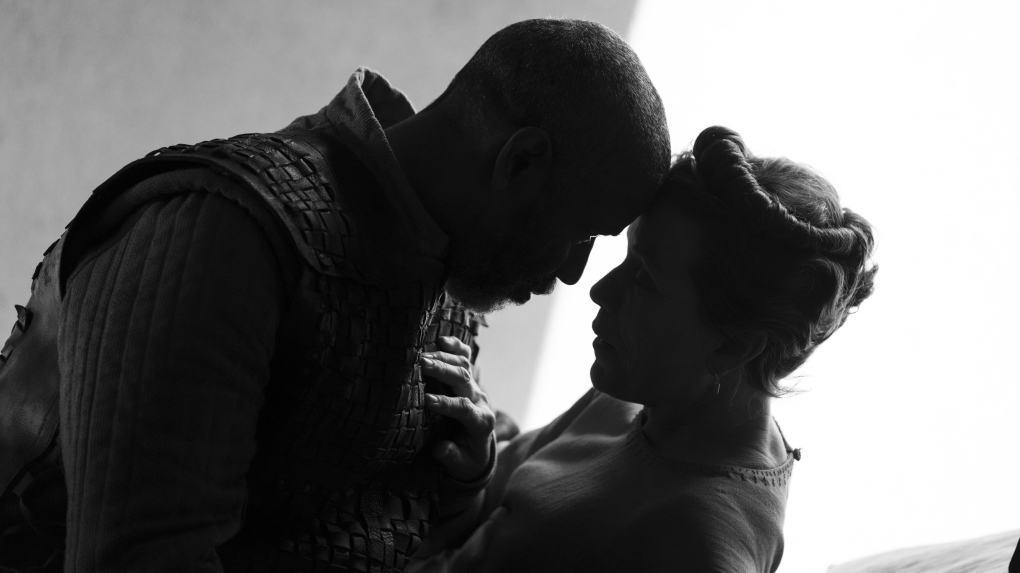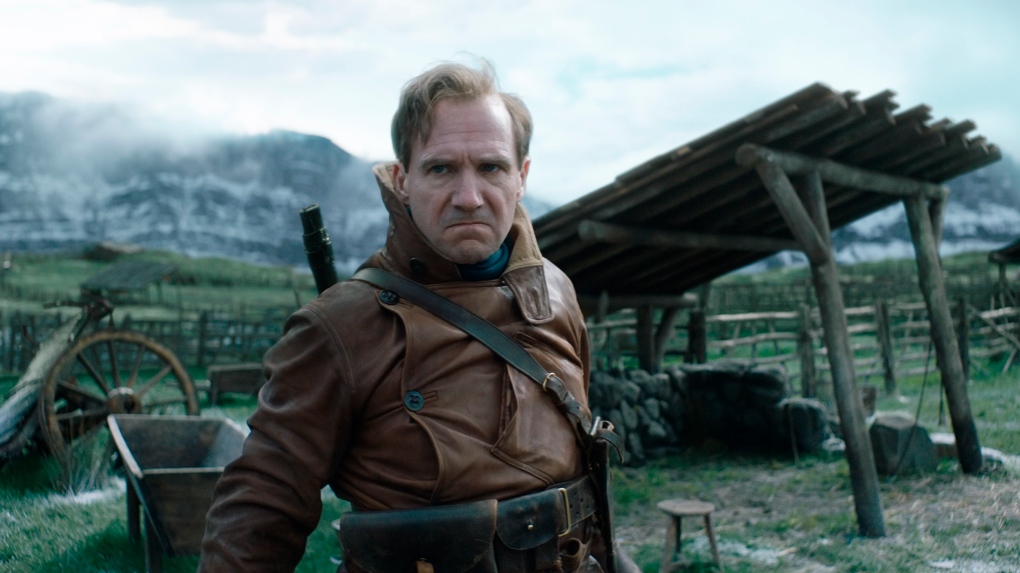THE MATRIX RESURRECTIONS: 2 ½ STARS
 This image released by Warner Bros. Pictures shows Yahya Abdul-Mateen II in a scene from "The Matrix Resurrections." (Warner Bros. Pictures via AP)
This image released by Warner Bros. Pictures shows Yahya Abdul-Mateen II in a scene from "The Matrix Resurrections." (Warner Bros. Pictures via AP)
These days movies are regularly remade, rebooted, reimagined and regurgitated. But none of those terms capture how Warner Bros has brought back one of their most famous and ground breaking franchises.
The new Keanu Reeves movie isn’t simply a return to the Matrix—the simulated reality created by intelligent machines to pacify humans and steal their energy—it’s a resurrection. After 18 years, Neo has been raised from the dead by Lana Wachowski in “The Matrix Resurrections,” now playing in theatres.
The last time we saw Neo (Reeves) he made the ultimate sacrifice, giving himself to create peace between machines and mankind. His death would allow people to finally be free of the virtual world of the Matrix.
In “Resurrections,” it’s 20 years later. Neo now goes by his real name, Thomas A. Anderson. He is the “greatest video game designer of his generation,” with an ordinary life, save for the visions that plague him. “I’ve had dreams,” he says, “that weren’t just dreams.” His analyst (Neil Patrick Harris) has him on a steady diet of heavy therapy and blue pills, meant to quell the strange delusions.
Anderson’s regular life is turned upside down when his business partner Smith (Jonathan Groff) announces that their company will be making a sequel to their most popular game, “The Matrix.” As his team works on the new game—“It’s a mind bomb!”—his memories become more intense and soon he has trouble distinguishing fact from fiction.
Or is it all real?
When people from his past, like computer programmer and hacker Trinity (Carrie-Anne Moss) and Morpheus (Yahya Abdul-Mateen II), an alternate reality version of the heroic Matrix hovercraft captain who first believed Neo was “The One,” appear, Thomas fears he is losing his mind.
Things become clearer—or do they?—when the new Morpheus offers Thomas/Neo a choice of pills. The blue ones will keep Thomas’ state of mind status quo. The red ones, however, will take him down the rabbit hole, into the heart of The Matrix. “Nothing comforts anxiety like a little nostalgia,” says Morpheus.
Pill popped, the simulated world opens up to reveal a dangerous place in need of a hero. Teaming with a group of rebels, Neo battles a new enemy and secrets are revealed. “The Matrix is the same or worse,” says Neo. “And I’m back where I started. It feels like none of it mattered.”
“The Matrix Resurrections” may be the most self-aware movie of the year. No installment of “The Matrix” will ever match the Whiz Bang excitement of the first film, and “Resurrections” knows it. It comments on itself and consistently winks at its legacy.
“This cannot be a retread, reboot or regurgitation,” says one of the “Matrix” video game designers.
“Why not?” says another. “Reboots sell.”
Like the movie’s plot, the film itself attempts to blur the line between the reality of the story and the very act of watching the movie. It is simultaneously self-depreciating and cynical. It’s OK to have a bit of good fun with the story, especially given the oh-so-serious tone of the previous “Matrix” movies, but by the time Thomas meets Trinity at the Simulatte Café, the jokes have worn thin.
The meat of the story, a search for truth, is the engine that keeps the movie motoring along, but the endless exposition, a torrent of words, seems to be the fuel that keeps things running. When a character says, “That’s the thing about stories, they never end,” it’s hard to disagree as the movie gets mired in mythology and world building.
It becomes a slog, without enough of the trademarked Wachowski action scenes to help pick up the pace. When the movie does dip into bullet time and the action that made the original so memorable, it feels like a pale comparison. There is nothing much new—“I still know Kung Fu,” says Neo—just frenetic action and nostalgia for a time when a slow-motion bullet made our eyeballs dance.
“The Matrix Resurrections” does try to recontextualize the existing mythology. This time, the all-you-need-is-love-story between Neo and Trinity is amped up and there is some timely social commentary about control, whether it’s from the government or a virtual reality machine, but, and there is a big but, as much as I wanted to enjoy another trip to the Matrix, I found it too meta, too long and yet, not ambitious enough.
LICORICE PIZZA: 4 STARS
 This image released by MGM shows Cooper Hoffman, left, and Alana Haim in a scene from "Licorice Pizza." (Melinda Sue Gordon/MGM via AP)
This image released by MGM shows Cooper Hoffman, left, and Alana Haim in a scene from "Licorice Pizza." (Melinda Sue Gordon/MGM via AP)
“Licorice Pizza,” the new slice-of-life drama from director Paul Thomas Anderson, and now playing in theatres, is a very specific movie. It transports us back in time to Los Angeles circa the 1970s. Nixon is president. In Hollywood, the Tail o' the Cock restaurant is the place to see and be seen, and gas stations face country-wide fuel shortages. But against that specific backdrop comes a story ripe with freewheeling charm, nostalgia and universal themes.
Cooper Hoffman, son of the late, great Philip Seymour Hoffman, is Gary Valentine, a cocky 15 year old actor with a blossoming career and a back pocket filled with get rich quick schemes. At picture day at his high school, he spots photographer’s assistant Alana (Alana Haim). She is 10 years older than him, but he’s feeling lucky and asks her out on a date. She agrees, but says it isn’t a date, just dinner. He takes her to hotspot Tail o' the Cock and at the end of the night tells her, “I’m not going to forget you. Just like you’re not going to forget me.”
It is the beginning of a mostly platonic relationship that sees them drift in and out of one another’s lives, start a water bed business and navigate maturity. “Maybe fate brought us together,” Gary says to her. “Our roads brought us here.”
“Licorice Pizza” (the name refers to a defunct Californian record store chain) isn’t a movie overly concerned with plot. Instead, it relies on the characters to keep things interesting.
Newcomers Hoffman and Haim (she plays guitars and keyboards in the pop rock band Haim) do just that. Each are magnetic performers on their own; she is all glowering intensity, he’s got teenage swagger down to a tee—“I’m a showman,” he says. “It’s what I’m meant to do.”—but put them together and sparks fly. From their first exchange in the high school gym to the film’s closing moments, they win us over. In the movie, the characters experience the first blush of friendship and love. In the audience, we get to experience another first, the debut of two new, very promising actors.
Later, after the film, I found myself daydreaming that perhaps we could revisit them every 10 years or so à la the relationship trilogy “Before Sunrise,” “Before Sunset” and “Before Midnight.”
Some old-timers get to strut their stuff as well. Sean Penn plays a riff on hard-drinking actor William Holden with equal parts smarm and charm, and Bradley Cooper pulls out all the stops to bring Hollywood hairdresser-turned-movie mogul Jon Peters to vivid, excessive life.
It is an evocative rendering of a specific time and place, but it doesn’t all sit right. In his recreation of the 1970s, director Paul Thomas Anderson includes two scenes featuring John Michael Higgins as Jerry Frick, owner of the San Fernando Valley’s first Japanese restaurant, The Mikado. In his two scenes he is seen speaking with an over-the-top, buffoonish Japanese accent in conversation with his Japanese wives, played by Yumi Mizui and Megumi Anjo. Both scenes stick out like sore thumbs. I imagine that they are meant to represent the causal racism of the time, but they break the movie’s magical spell with cultural insensitivity that adds nothing, save for a cheap laugh, to the story.
“Licorice Pizza” is kind of like flipping through a diary. Some details are intense, some glossed over, but everything is relevant to the experience being written about. Like diary entries, the movie is episodic. Each passing episode allows us to get to know Gary and Alana a bit better, and just as importantly, remind us what it means to be young and in love.
THE TRAGEDY OF MACBETH: 4 STARS
 This image released by A24 shows Denzel Washington, left, and Frances McDormand in "The Tragedy of Macbeth." (A24 via AP)
This image released by A24 shows Denzel Washington, left, and Frances McDormand in "The Tragedy of Macbeth." (A24 via AP)
Austere and theatrical, “The Tragedy of Macbeth,” in theatres on Dec. 25 and streaming on Apple TV+ on Jan. 14, feels like an up-scale horror film in its examination of ambition and violence.
The plot is familiar from high school English class. Three witches (all played by Kathryn Hunter) prophesize that Macbeth (Denzel Washington), a heroic general in King Duncan's (Brendan Gleeson) army, is bound for glory. He will be named Thane of Cawdor, they say, and one day, if he has the backbone, king. It is welcome news for the ambitious warrior and his ruthlessly Machiavellian wife, Lady Macbeth (Frances McDormand), who helps kickstart her husband’s rise to power by devising a plot to kill the king.
Their bloody coup sees the well-liked Duncan murdered, triggering Macbeth’s ascent to the throne. The couple’s lust for power leads to a reign of terror, which includes the wholesale slaughter of King Duncan loyalist Macduff's (Corey Hawkins) family and a civil war.
The crown sits heavily on their collective heads. The new power couple are soon overwhelmed by insomnia, festering paranoia and guilt. “By the pricking of my thumbs,” says one of the witches, “something wicked this way comes.”
Adapted for the screen by director Joel Coen, working for the first time without his brother Ethan, “The Tragedy of Macbeth” blends theatre and cinema in a seamless and powerful way. The expressionistic sets and minimalist soundtrack feel transported in from the theatre, while the beautiful stark, black-and-white photography and charismatic performances are pure cinema.
Washington is quietly powerful as his immorality grows. His entrance, a bold walk straight up to the camera out of the fog, establishes his movie star cred. His letter-perfect line readings, imbuing meaning and emotion into even the most intimidating of Shakespeare’s passages, proves he was born to say these words.
McDormand plays Lady Macbeth as her husband’s equal. She captures her ambition, but tempers the performance with notes of desperation.
Also striking is legendary stage actress Kathryn Hunter. She plays all three of the prophetic weird sisters in a physically transformative way that sees her bend into shapes that look almost supernatural.
All are ably supported by an exemplary cast, including Gleeson, Corey Hawkins as Macduff, the Thane of Fife, Bertie Carvel as Macbeth ally Banquo, and Harry Melling as Malcolm, King Duncan’s eldest.
“The Tragedy of Macbeth” is accessible without ever playing down to the audience. Masterful filmmaking mixes and matches the text with compelling images and wonderful performances to create a new take on the Scottish Play that is both respectful and fearlessly fresh.
Go see it, “Tomorrow, and tomorrow, and tomorrow…”
THE KING'S MAN: 2 ½ STARS
 This image released by 20th Century Studios shows Ralph Fiennes in a scene from "The King's Man." (20th Century Studios via AP)
This image released by 20th Century Studios shows Ralph Fiennes in a scene from "The King's Man." (20th Century Studios via AP)
In these movies, The Kingsmen are a secret spy organization whose members have manners that would make Henry Higgins proud and gadgets that James Bond would envy. They’ve been the subject of two movies, “Kingsman: The Secret Service” and “Kingsman: The Golden Circle,” and now, three movies into director Matthew Vaughn’s spy franchise comes an origin story that takes us back to the early part of the 20th century and the confusing beginnings of these modern-day knights.
“The King’s Man,” now playing in theatres, begins with a tragedy that makes the wealthy and powerful Duke of Oxford (Ralph Fiennes) reject the colonialism and violence that is the bedrock of his family’s fortune. He questions why he was killing people who were trying to protect their own land. “With every man I killed,” he said, “I killed a piece of myself.”
Meanwhile, as the First World War approaches, an assembly of the world’s most despicable tyrants and villains, working for an evil mastermind with plans for world domination, are hatching a plan that could lead to genocide.
With the lives of millions at stake, and his son Conrad (Harris Dickinson) off to war, the Duke realizes he can’t rely on politicians to do the right thing. In an effort to save the world, he abandons his pacifist ways. With the help of his most trusted colleagues, swordsman Shola (Djimon Hounsou) and sharp shooter Polly (Gemma Arterton), he goes into the fray and sews the seeds for the formation of The Kingsmen, an organization that uses violence to attain peace.
The first two "Kingsman" movies were overstuffed, but had a certain lightness of touch. Unfortunately, “The King’s Man” lands with a thud. A mix of fact (well, almost true stuff) and fiction—real life characters like Rasputin, the mad Russian monk, (Rhys Ifans) are woven into the fanciful story—the movie is all over the place. It’s a spy story, a tale of duty, a slapstick comedy, an action film, a fractured fairy tale of world events.
Some of the action scenes are quite fun and Ifans eats so much scenery it feels like he’ll never go hungry again, but the story takes far too long to get going.
“The King’s Man” feels as though it is splintering off in all directions, like it’s three movies spliced-and-diced into one, bloated, messy sequel-ready story.













































